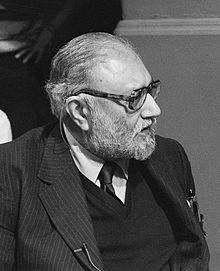Abdus Salam
Abdus Salam | |
|---|---|
 Abdus Salam in 1987 | |
| Kapanganakan | 29 Enero 1926 |
| Kamatayan | 21 Nobyembre 1996 (edad 70) |
| Nasyonalidad | British Indian (1926–1947) Pakistani (1947–1996) |
| Nagtapos | Government College University Lahore (BA) University of Mumbai Punjab University (MA) St. John's College, Cambridge (PhD) |
| Kilala sa | |
| Asawa | Amtul Hafeez Begum (k. 1949–96)
Louise Johnson (k. 1968–96) |
| Anak | 6 |
| Parangal | Smith's Prize (1950) Adams Prize (1958) Sitara-e-Pakistan (1959) Hughes Medal (1964) Atoms for Peace Prize (1968) Royal Medal (1978) Matteucci Medal (1978) Nobel Prize in Physics (1979) Nishan-e-Imtiaz (1979) Lomonosov Gold Medal (1983) Copley Medal (1990) |
| Karera sa agham | |
| Larangan | Theoretical physics |
| Institusyon | |
| Tesis | Developments in quantum theory of fields (1952) |
| Doctoral advisor | Nicholas Kemmer |
| Academic advisors | Paul Matthews |
| Doctoral student | |
| Bantog na estudyante | |
| Impluwensiya | Paul Dirac[4] Anilendra Ganguly[5] |
| Pirma | |
 | |
Si Mohammad Abdus Salam[6][7][8] Padron:Post-nominals/PAK Padron:Post-nominals/PAK Padron:Post-nominals/PAK Padron:Post-nominals/PAK ( /sæˈlæm/; pronounced [əbd̪ʊs səlaːm]; 29 January 1926 – 21 November 1996)[9] ay iasng Pakistaning pisikong teoretikal at Nobel Laureate sa Pisika para sa kanyang kontribusyon kasama nina Sheldon Glashow at Steven Weinberg sa paliwanag ng interaksiyong elektroweak ng Pamantayang Modelo ng Pisika.[10] Siya ang kauna-unahang Pakista at Muslim ng He was the first Pakistani and the first from an Islamic country to receive a Nobel Prize in science and the second from an Islamic country to receive any Nobel Prize, after Anwar Sadat of Egypt.[11] Isa siyang kasapi ng Ahmadiyya Islam at noong 1974, nilisan ni Abdus Salam ang kanyang bansa bilang protesta pagkatapos na ang Parliamento ng Pakistan ay nagpasa ng bata ng nagdedeklarang ang mga kasapi ng sektang Ahmadiyya ng Islam ay hindi mga Muslim.
Mga sanggunian[baguhin | baguhin ang wikitext]
- ↑ Cheema, Hasham (29 January 2018). "Abdus Salam: The real story of Pakistan's Nobel prize winner". DAWN.COM.
- ↑ Fraser 2008, p. 119.
- ↑ Ashmore, Jonathan Felix (2016). "Paul Fatt. 13 January 1924 – 28 September 2014". Biographical Memoirs of Fellows of the Royal Society. London. 62: 167–186. doi:10.1098/rsbm.2016.0005. ISSN 0080-4606.
- ↑ Fraser 2008, pp. 280
- ↑ Wangchuk, Rinchen Norbu (18 October 2019). "'This is Your Prize, Sir.' How a Pak Nobel Laureate Paid Tribute to His Indian Guru" (sa Ingles). The Better India. Nakuha noong 31 August 2021.
"The teacher was feeble and unable to sit up and greet him when Dr Salam visited him in his house. Dr Salam took his Nobel medal and said that 'Mr Anilendra Ganguly this medal is a result of your teaching and love of mathematics that you instilled in me,' and he put the medal around his teachers' neck," writes Zia H Shah MD, a New York-based physician and Chief Editor of the Muslim Times, in this article. His son narrates another version of the story in the Netflix documentary. "He took the medal to his teacher in India, who was a very old [man] by then. His teacher was lying flat on his back and couldn't get out of bed. And there is a picture of my father putting the medal (Nobel Prize) into his hands… And he told him, 'This is your prize Sir. It's not mine.'"
- ↑ Fraser 2008, p. 249 Salam adopted the forename "Mohammad" in 1974 in response to the anti-Ahmadiyya decrees in Pakistan, similarly he grew his beard.
- ↑ Rizvi, Murtaza (21 November 2011). "Salaam Abdus Salam". The Dawn Newspapers. Inarkibo mula sa ang orihinal noong 17 February 2012.
Mohammad Abdus Salam (1926–1996) was his full name, which may add to the knowledge of those who wish he was either not Ahmadi or Pakistani. He was given the task of Pakistan's atomic bomb programme, as well as Pakistan Atomic Energy Commission to resolve energy crisis and Space and Upper Atmosphere Research Commission (SUPARCO). Unfortunately he failed in all the three fields.
- ↑ This is the standard transliteration (e.g. see the ICTP Website Naka-arkibo 28 February 2008 sa Wayback Machine. and Nobel Bio). See Abd as-Salam for more details.
- ↑ Kibble, T. W. B. (1998). "Abdus Salam, K. B. E.. 29 January 1926 – 21 November 1996". Biographical Memoirs of Fellows of the Royal Society. 44: 387–401. doi:10.1098/rsbm.1998.0025. JSTOR 770251.
- ↑ "1979 Nobel Prize in Physics". Nobel Prize. Inarkibo mula sa orihinal noong 6 July 2014.
- ↑ (Ghani 1982, pp. i–xi)
